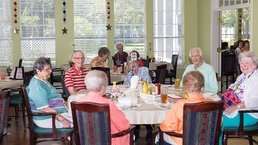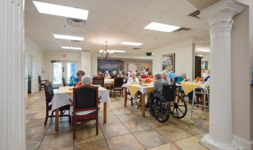Located at the mouth of the Mississippi River in southeastern Louisiana, Baton Rouge is home to just over 220,000 people, including about 29,730 seniors. The city has mild winters and hot summers, so seniors don’t need to worry about shoveling snow. The city is famous for its arts and culture scene, and retirees can enjoy Creole cuisine at local hot spots, visit one of the city’s many art galleries and stop by historic sites, such as the Old Hickory Railroad. With retiree-friendly tax policies and a cost of living that’s lower than the national average, seniors can enjoy this vibrant city on a budget.
In assisted living facilities, around-the-clock staff is on duty to quickly assist senior residents with personal care needs or emergencies. They also provide a social setting for seniors who still retain some independence and don’t yet need skilled nursing-level care. For Baton Rouge seniors, assisted living rates average $4,125 per month. This is about halfway between the lower state average and the higher national average.
In the following sections, we’ve compiled cost comparisons between Baton Rouge assisted living and nearby areas, a list of potential financial resources and explanations of laws relating to assisted living in the state.
Hundreds of thousands of American seniors utilize assisted living, a figure that is only growing. For these seniors, assisted living combines residential housing,assistance in daily activities, and some healthcare. These communities also strive to provide an atmosphere that is comfortable and engaging for their residents… Read More >
COVID-19 restrictions and rules for Assisted Living Facilities are typically set by the state – to see the rules in your state, you can read our guide to Assisted Living in Louisiana. Keep in mind that there may be other policies that communities put in place to protect their residents, so you should contact your local community for more information. Additionally, you can contact your local Area Agency on Aging to learn more – find contact information here.
An average monthly cost of assisted living in Baton Rouge is $4,125, as disclosed by Genworth’s Cost of Care Survey 2021.
At $3,748 per month, Louisiana’s average cost of assisted living is $377 less per month than the monthly average rate of $4,125 in Baton Rouge. However, Baton Rouge seniors still save $375 per month compared to the U.S. average.
Louisiana’s average assisted living rates range from $2,650 to $4,800, with Monroe being the most affordable city and the Houma area being the most costly. Besides rates in Lake Charles ($4,000) and Baton Rouge ($4,125), prices average below $4,000 in the remaining cities. These include rates in New Orleans ($3,973), Hammond ($3,450) and Alexandria ($2,900).

Since not everyone can afford to pay for assisted living out-of-pocket, it’s important to find alternative methods to help make assisted living more affordable. Some of these options include:
For more information about your options for making assisted living more affordable, visit our guide to Assisted Living in Louisiana.
| Contact | Description | |
| East Baton Rouge Council on Aging (EBRCOA) | As the city’s Area Agency on Aging, the EBRCOA offers services to help seniors live independently. Its trained care managers provide information and assistance to seniors. Other services include insurance counseling and help with Medicaid applications. Through the Lotus Rides program, the EBRCOA gives low-income seniors rides to and from community centers. | |
| The Pearl George Senior Center | (225) 389-3000 | Seniors can take advantage of the many services and programs at the city’s Pearl George Senior Center. The center serves lunch every weekday, and seniors are asked to donate $1.50 per meal. It also offers fitness classes and a number of arts and crafts courses, including pottery, clay molding and sculpting. Seniors who enjoy gardening are able to pot indoor plants or work in the center’s garden. |
| Southeast Louisiana Legal Services | (225) 448-0080 | Southeast Louisiana Legal Services offers free legal aid to vulnerable people, including low-income seniors. Eligible seniors can get help with a wide variety of civil legal issues, including hearings and appeals for government benefits. It can also provide assistance in the areas of consumer law, family law and disaster law. |
| The Osher Lifelong Learning Institute at Louisiana State University | (225) 578-6763 | Interested seniors can register for low-cost noncredit courses at Louisiana State University. The annual membership fee is $50, and individual course fees are between $10 and $40. These courses cover subjects as varied as yoga, history, literature and foreign languages. Seniors can also join their classmates on field trips, nature walks and other educational outings. |
| Baton Rouge Vet Center | (225) 761-3140 | One of 300 Vet Centers across the country, the Baton Rouge location provides counseling and outreach services to eligible veterans. These services may include individual counseling, substance abuse assessments and suicide prevention services. |
| Louisiana Assistive Technology Access Network | (225) 925-9500 | This nonprofit organization helps people with limitations and disabilities, including seniors, access assistive technologies. It offers hands-on demonstrations of over 600 different devices to help seniors identify the ones that meet their needs. To make these technologies more accessible to seniors, it offers zero and low-interest leasing options. |
| Volunteer Louisiana | (225) 342-2038 | Volunteer Louisiana oversees Senior Corps, a network of programs that give people aged 55 and older the opportunity to serve their community. Through the Senior Corps’ Foster Grandparent program, seniors can have a positive impact on children’s lives. Another Senior Corps initiative, the Retired and Senior Volunteer Program (RSVP) connects older adults with volunteer opportunities. Seniors can choose where and how often to volunteer. |
Assisted Living Facilities in the Baton Rouge area are required to follow a set of rules and regulations that are determined at the state level. For an overview of those rules and regulations, see the information below. For more specific information, talk with your local community or Area Agency on Aging.














